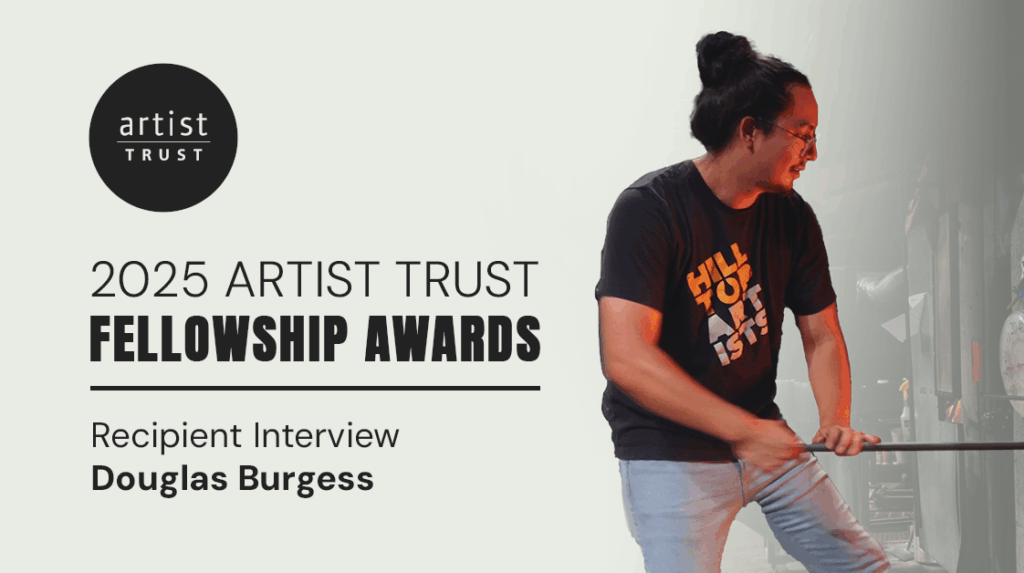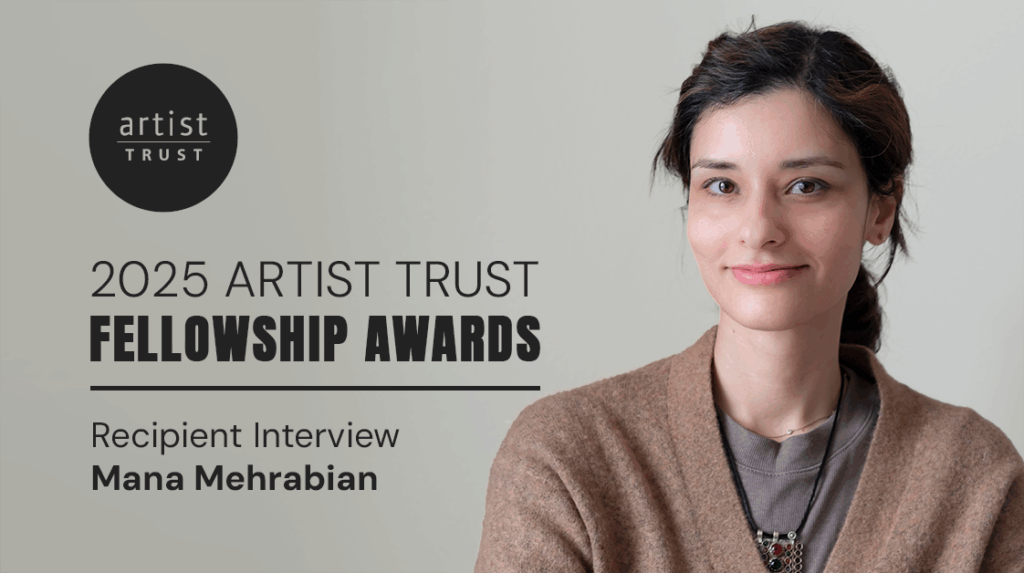Home > News & Stories > Meet the 2024 Fellows: Nicole Pouchet
News & Stories
Meet the 2024 Fellows: Nicole Pouchet
Published: September 10, 2024
Categories: Artist Interviews

About Artist Trust Fellowships
Artist Trust Fellowships are merit-based awards of $10,000 providing unrestricted support to practicing professional artists of exceptional talent and ability residing in Washington State. The first Artist Trust Fellowship Awards were selected in 1987, making it our longest-running award program. In 2024, $150,000 was awarded to 15 artists across five Washington State counties.
Our Meet the Fellows series highlights each of the award winners over the year in a series of interviews, talks, blog posts, and social media highlights. To support grants programs like the Artist Trust Fellowships, visit artisttrust.org/donate
Interview with 2024 Artist Trust Fellowship Recipient Nicole Pouchet
Please introduce yourself and share a little about yourself and your background
Hello, I’m Nicole Pouchet. I’ve been immersed in the film industry for about seven years now. However, my first novel was published in 2013. I’ve always been a writer, and I got into screenwriting because I wanted to see my imagination come to life on the screen. Instead of finding someone to adapt my books into screenplays, I learned to do it myself.
That mindset of “do it yourself” is how I ended up at this point in my career. After winning festivals for the short film I wrote in 2018, I realized I needed to put my college training and theater background to use. As a director, I can ensure my message is interpreted the way I intend. After the pandemic, I jumped fully into producing in order to get my movies made.
However, I should be clear that I don’t believe the old adage, “if you want it done right, you have to do it yourself” works for film. Film is about collaboration, and the various teams with whom I’ve worked have been amazing.
I’m now raising funds for my first feature film, a romance fantasy adapted from one of my favorite novels, Her Mad Hatter (by Marie Hall). We just finished creating a gorgeous proof of concept that illustrates how well we can create Wonderland scenes in Washington state using virtual sets and the video game platform, Unreal Engine.
 Nicole Pouchet, Sticky Buns, Ravioli, and White Cake, Short Film, 2024, a proof of concept for Her Mad Hatter, upcoming feature, © Morning Lark Productions
Nicole Pouchet, Sticky Buns, Ravioli, and White Cake, Short Film, 2024, a proof of concept for Her Mad Hatter, upcoming feature, © Morning Lark Productions Nicole Pouchet, Retch, Short Film, 2019, © Morning Lark Productions
Nicole Pouchet, Retch, Short Film, 2019, © Morning Lark Productions Nicole Pouchet, Such an Honor, Short Film, 2020, © Morning Lark Productions
Nicole Pouchet, Such an Honor, Short Film, 2020, © Morning Lark Productions
Your work tends to amplify daily discrimination and prejudice. How has filmmaking helped you think about these things?
My first film, Retch, came about because a friend challenged me to write what scares me. That horror film is rooted in the idea that other people’s causal biases can kill us. Many races, ages, sexualities, and genders were represented in the film, so the film could have delved into every form of discrimination. We chose to focus on race and religion in order to get the message across in a clear manner. With each subsequent film, I try to focus on a single issue in the same way.
That idea of having a single focus has influenced my views on life and social justice itself. So often, the world seems impossible because of the myriad of colossal problems we face as a society. It’s easy to feel guilty for not devoting time to every issue. But, in much the same way that a single film cannot explore every social issue, a single individual cannot meaningfully support all causes. We each have to do our own part. I make movies that hopefully open people’s eyes. A friend works to reduce homelessness in his town. Another friend donates money. Every contribution is important.
Art is constantly changing and developing. How has your work developed over the last few years?
I came to screenplays from novels. In a novel, I could write whatever I wanted. A dragon could hop from a spiky star to a plushy planet, reveling in the sweet taste of space dust. With screenwriting, I accepted that the medium of film requires a practical limitation on fantastical characters, a consideration of budget, and a restriction to only two senses—vision and sound.
In the last few years, I’ve stopped limiting my writing based on those practicalities, and started exploring how to get as close to my imagination as possible, even without the hundred million-dollar budgets. I’ve gotten much more into technology as part of my art. The video game platform, Unreal Engine, allows us to create fantastical worlds and characters that would otherwise cost millions of dollars.
As I get more comfortable with Unreal Engine, the ability to film on virtual sets has allowed me to confidently develop the fantasy aspects of storytelling.
 Nicole Pouchet, Sticky Buns, Ravioli, and White Cake, Short Film, 2024, a proof of concept for Her Mad Hatter, upcoming feature, © Morning Lark Productions
Nicole Pouchet, Sticky Buns, Ravioli, and White Cake, Short Film, 2024, a proof of concept for Her Mad Hatter, upcoming feature, © Morning Lark Productions
What keeps your creative practice moving forward? Why do you create?
Joan Didion said it best: “I don’t know what I think until I write it down.” I write because I have to. Writing is the way I process my thoughts and feelings.
Certain movies change the world. Introducing controversial concepts and illustrating the visceral feelings of others is an effective way to get the audience to care about their fellow human beings. I make movies because I want to help change the world to be a better, more caring place. Also, it’s fun!
As a 2024 Fellowship Recipient, can you please talk about how this award impacts you?
This fellowship has been critical to my ability to continue progressing in my career. I used a portion of the award to help fund the proof of concept (Sticky Buns, Ravioli, and White Cake) for my feature film. This proof of concept has shored up interest and confidence in the project in a way that no pitch deck or meeting ever could have. Thank you!
How can Artist Trust continue to support artists across Washington State?
People need money in order to survive in this world. Artist Trust allows artists to create for a bit without that ever-present threat of financial ruin. The awards can be life-changing. My suggestion is to keep doing what you’re doing for as many artists as possible.
 Nicole Pouchet, Strowlers, TV Episode, 2021, © Zombie Orpheus Entertainment
Nicole Pouchet, Strowlers, TV Episode, 2021, © Zombie Orpheus Entertainment
2024 Meet The FellowsArtist Trust Fellowship AwardsInterviewJoyce Chen
Support Artists
We work hard serving thousands of individual artists across Washington State each year, but we can’t do it without you! Learn how you can support artists year-round.
Image: Peggy Piacenza, 2024 Fellowship Recipient

